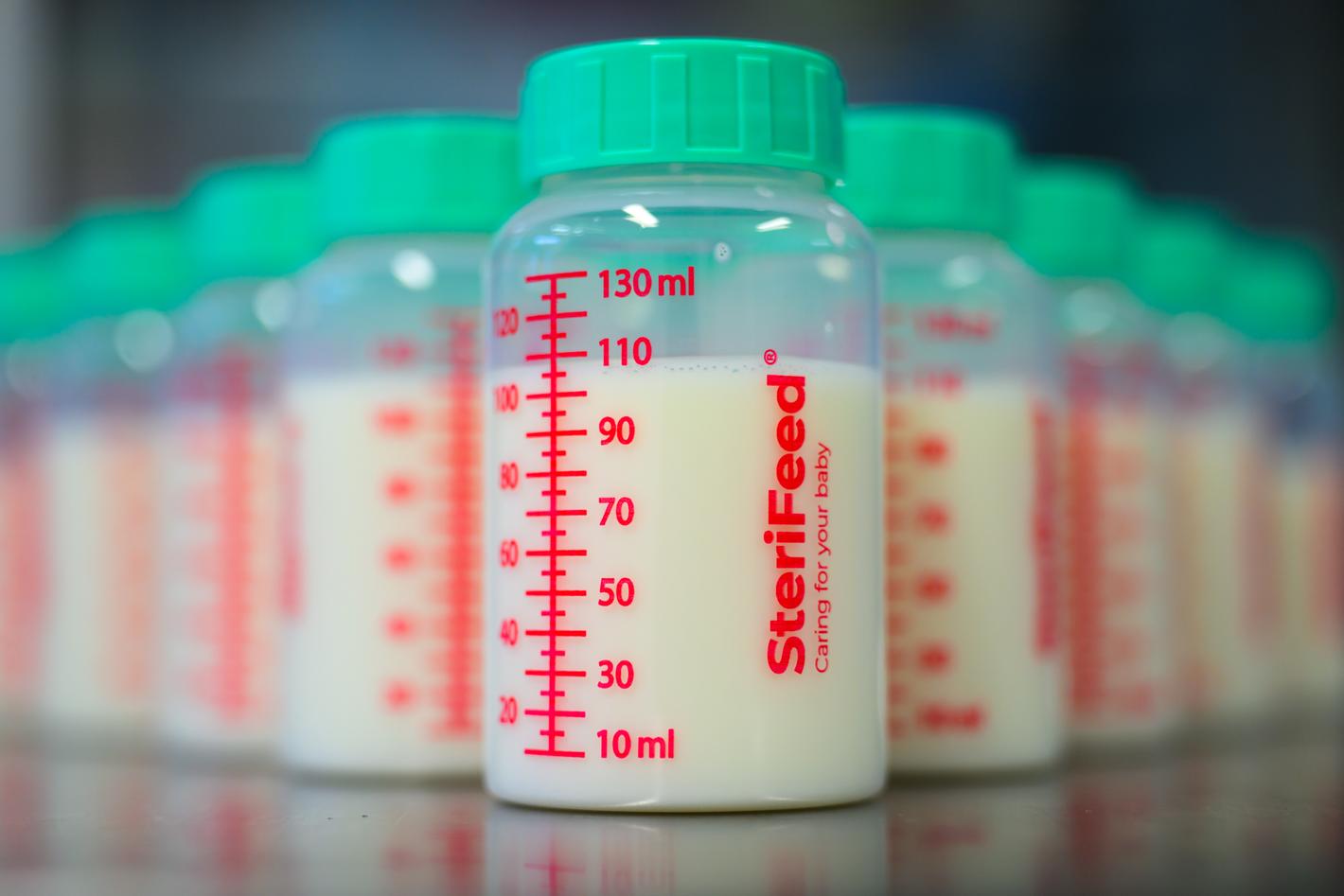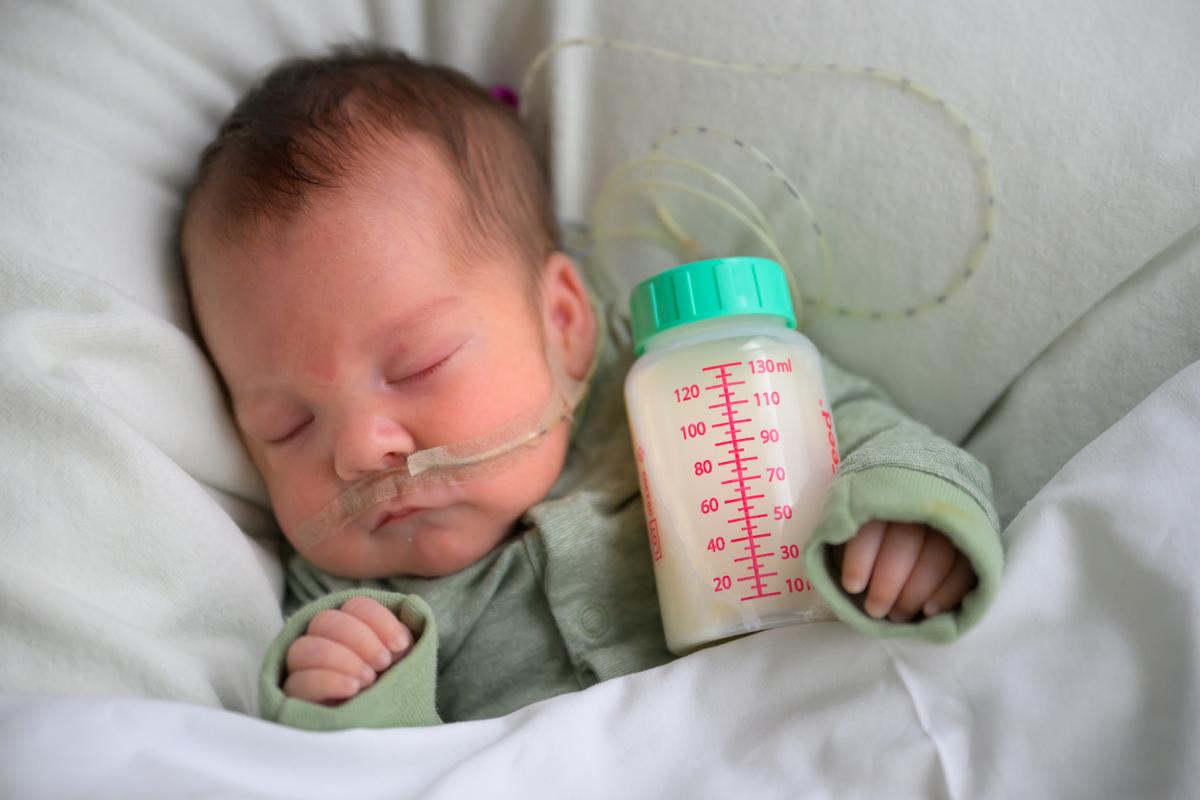Why donate breast milk?
Breast milk plays a therapeutic role in the care of premature babies and protects them against certain complications, such as serious intestinal infections.
If a mother cannot produce enough of her own milk, or cannot breastfeed for medical reasons, donor breast milk can take over this therapeutic role.
When my son was born prematurely, my milk supply was slow to get going. Thanks to donor milk, we were able to give him a strong start in life. Now that I’m able to donate myself, it feels like I can give all that love and care back.
Who can donate breast milk?
There are a few simple requirements to make sure your milk is safe and suitable for the babies who need it:
- You are a healthy mother with a good milk supply and a surplus beyond what your own baby needs.
- You lead a healthy lifestyle: you do not smoke, do not use drugs, and preferably drink no alcohol or only very occasionally.
- Your milk is freshly and hygienically expressed: we ask you to follow specific guidelines when expressing and freezing your breast milk.
Breast milk donation is subject to conditions similar to blood donation. This ensures that your milk is of the highest quality for the babies who need it.
You are not eligible to donate breast milk if you:
- take certain medications
- have HIV, hepatitis B or C
- smoke, use alcohol or drugs
- consume large amounts of caffeinated drinks
- follow a non-supplemented vegan diet
- in the past 6 months, have:
- had a new tattoo, piercing or permanent make-up
- received a blood transfusion
- had a needlestick injury
- had risky and/or sexual contact with multiple partners
If you have any questions or doubts about your eligibility, don’t hesitate to contact us – we’re happy to help!
With every drop I express, I know I can make a difference in the life of a vulnerable baby – that’s incredibly rewarding.
How to become a donor
If you decide to donate breast milk, a screening process is required. This is essential because the milk is given to vulnerable, premature babies. The screening involves three steps: a questionnaire, an introductory meeting, and a blood test.
Convinced? Register as a donor today.
I never expected to produce more breast milk than my own baby needed. When I heard about the donor milk bank, it felt like the perfect solution. I’m so glad that my surplus can help support vulnerable and sick babies.
Starting to donate
If you’re approved to donate breast milk, you can start expressing for the donor milk bank. It’s important to first have a stable breast milk supply for your own baby — usually around 6 weeks after birth — before expressing milk for donation.
Losing my baby left a void, but by donating breast milk, I was able to contribute to something beautiful. It brings me great comfort to know that my milk isn’t going to waste, but rather becoming a source of strength for other babies.
Collecting your milk

A courier will come to your home to collect the frozen bottles.
Please contact the donor milk bank if either:
- your stock of bottles is
nearly finished, or - a bottle is close to being
2 months old.
Frequently asked questions
After registering, you will receive a questionnaire that takes about 10–15 minutes to complete. Then we’ll invite you for an introductory conversation and a blood test.
If you live in the Leuven region, we prefer to invite you to UZ Leuven for the conversation and blood test. This can be combined with another hospital appointment, such as a postnatal consultation. The visit takes around 20–30 minutes.
If this is not possible or desirable, the conversation can also take place by phone or online. You can then have the blood test done by your general practitioner.
If your baby is still hospitalised at UZ Leuven, the donor milk bank coordinator can also visit your room.
Yes, this is sometimes possible, depending on which tests were done and when they were performed.
Your screening results are valid for three months. If your lifestyle or medical condition changes in a way that could make donation risky, a new test will be required.
Even if nothing changes, we ask you to have a new blood test every three months while you are donating breast milk.
No, we screen donor candidates across Flanders and Brussels. After you register, the donor milk bank coordinator will contact you to determine the best way to organise the screening.
Our courier collects donor milk throughout Flanders and Brussels.
No, this is not allowed for safety reasons. The only exception is breast milk that was stored in a neonatal intensive care unit (NICU).
Contact the donor milk bank when the oldest bottle in your freezer is nearly 2 months old or when your supply is almost used up.
You can then make an appointment with the courier service to collect the frozen donor milk. If needed, the courier will provide you with new bottles and labels.
We will share the courier’s contact details and opening hours with you.
Once received by the donor milk bank, we check that all bottles are properly labelled and dated, and that none of the milk has thawed. The milk is then thawed in a controlled way and tested for harmful bacteria.
It is then pasteurised (heated) and given a new label. Another sample is taken for bacterial testing before the milk is refrozen.
Once a doctor gives authorisation, the donor milk is delivered to a neonatal unit in Belgium. A paediatrician prescribes donor milk to eligible babies whose parents have given consent.
Breast milk donation is voluntary and not compensated.
However, the donor milk bank covers the cost of the blood test:
- If you have the blood test done at UZ Leuven, you will not receive an invoice.
- If you go to your general practitioner, you can submit the consultation (co-payment) and lab analysis costs to the donor milk bank.
As a donor, you'll receive free bottles and labels. You’ll need to rent or buy your own breast pump and pumping kit.
We advise against drinking alcohol. If you do have a drink on a special occasion, please inform the donor milk bank. The milk you express that day must not be donated.
It’s important to have a stable breast milk supply for your own baby first — usually around 6 weeks after birth — before donating. You can donate until your baby is about two years old.
All personal data collected during screening and donation is carefully stored and processed in line with GDPR regulations. Where possible, we pseudonymise your data — replacing your personal details with codes or numbers to protect your identity. This ensures your privacy while still allowing us to contact you if needed.
Parents of babies who receive your milk will never have access to your personal information. Your data may also be used for research to improve our understanding of breast milk donors, for clinical audits, and to assess the quality of our milk bank.
Would you like to view your data? Contact the donor milk bank coordinator.
If you become ill, develop mastitis, or need to take medication while donating, please contact the donor milk bank — ideally by email. We will check whether the medication is compatible with milk donation. Since the milk is given to vulnerable babies, stricter guidelines apply than for breastfeeding your own child.
In case of mastitis, we ask that you pause donation temporarily. Once you’ve recovered, you can resume donating in consultation with us.
Questions or feedback
-
Ready to donate breast milk? Let us know via the registration form.
-
+32 16 34 76 73 – Monday to Friday from 09:00 to 17:00
